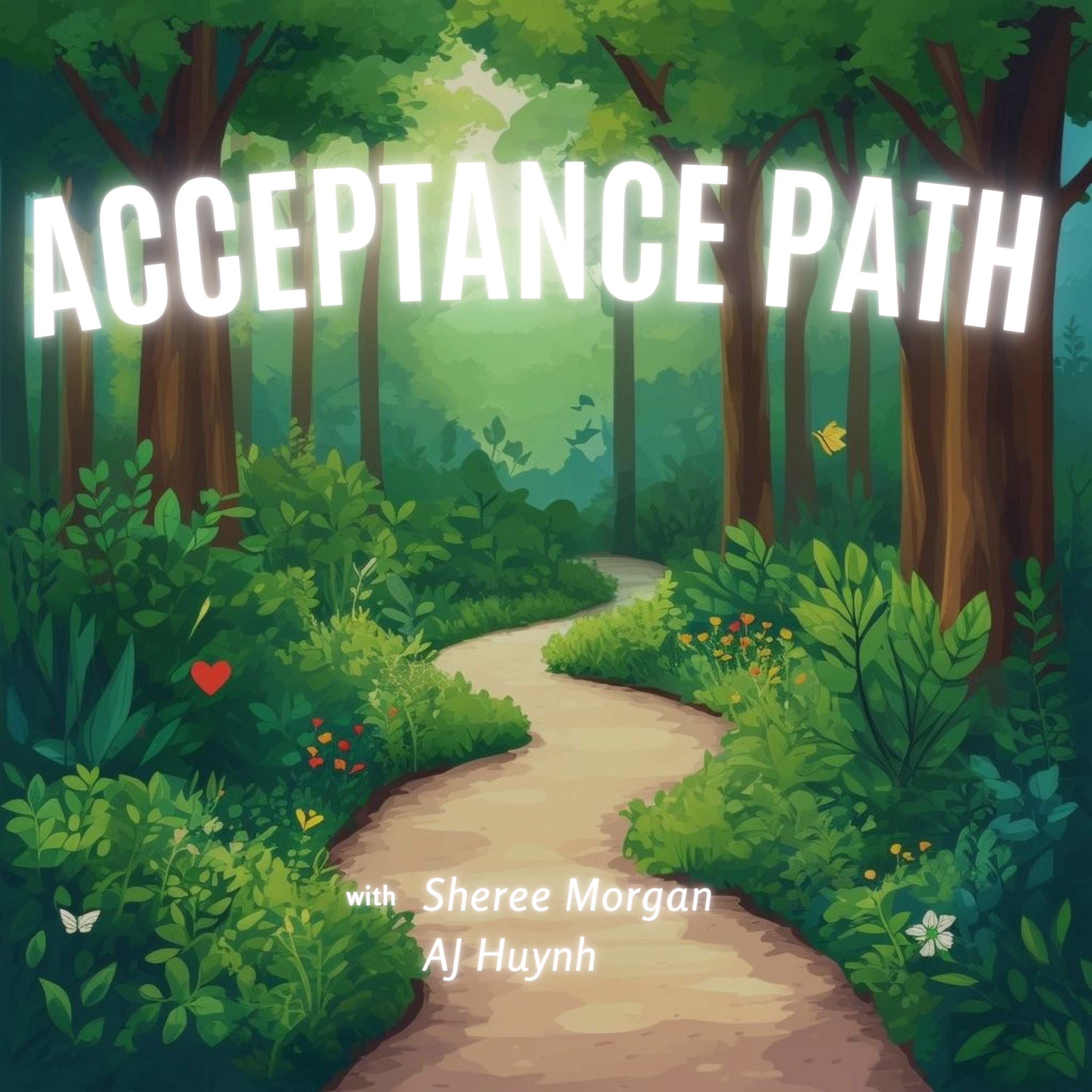
Two mental health experts have joined forces to make an uplifting podcast about well-being and personal growth. We use this show to share fresh and sometimes eye-opening ideas, helping listeners create a more fulfilling life. We’re not pushing any one viewpoint – instead, we’ll bring in guests from all walks of life to expand our understanding of the world. Come along with us as we explore different outlooks together.
Sheree Morgan and AJ Huynh discuss the importance of setting boundaries in adult relationships. They explore different types of boundaries, how to set them, and why they're crucial for maintaining healthy relationships. The hosts also delve into the cultural aspects of boundaries and how individual context plays a significant role in determining appropriate boundaries.

In the complex world of adult interactions, understanding and implementing boundaries in relationships is crucial for maintaining healthy connections. Whether with family, friends, romantic partners, or colleagues, boundaries in relationships help define what’s acceptable and keep both parties safe. However, setting and enforcing these limits can be challenging, especially for people pleasers or those from cultures that value close-knit family structures.
Understanding Boundaries in Relationships
Boundaries in relationships are essentially the limits we set to protect our physical and emotional well-being. They help us communicate our needs, values, and expectations to others. According to PsychCentral, there are seven types of boundaries:
- Mental: Freedom to have your own thoughts, values, and opinions
- Emotional: How emotionally available you are to others
- Material: Decisions about lending or giving possessions
- Physical: Privacy, personal space, and bodily autonomy
- Time: How much time you spend with someone or on activities
- Internal: Self-regulation and energy management
- Conversational: Topics you’re comfortable or uncomfortable discussing
While it’s helpful to understand these categories, it’s more important to focus on the practical application of boundaries in relationships in real-life situations.
The Importance of Context
When it comes to setting boundaries in relationships, context is key. What’s appropriate in one situation may not be in another. For example, hugging might be welcome at a fundraising event but uncomfortable in a professional setting. Similarly, lending money to a friend in need might be acceptable, but not if it enables harmful behaviors.
AJ, one of the podcast hosts, emphasizes a pragmatic approach to boundaries in relationships: “Is me spending energy towards this person or situation helping me towards where I want to go?” If the answer is no, that’s a sign a boundary needs to be set.

Challenges in Setting Boundaries in Relationships
Establishing boundaries in relationships can be particularly challenging in certain situations:
- Parent & Adult-Child Relationships: Parents may struggle to step back and allow their adult children to make independent decisions. Conversely, adult children might find it difficult to assert boundaries with parents who are used to having authority over them.
- Cultural Expectations: In cultures that value collectivism and close family ties, setting individual boundaries might be seen as selfish or disrespectful.
- People Pleasing: Those who prioritize others’ happiness over their own needs often struggle to set and maintain boundaries.
- Fear of Conflict: Many people avoid setting boundaries in relationships because of fear of confrontation or damaging connections.
Real-Life Examples of Boundary Issues
- Financial Boundaries: Sheree shares an example of lending money for home down payments. While she and her husband were willing to help their children, they set clear expectations for repayment. This demonstrates how financial boundaries in relationships can be flexible yet still maintain responsibility.
- Time and Energy Boundaries: AJ discusses how he manages his time between work and personal life. He explains, “Sometimes I work weird hours. Sometimes I need to be isolated. She’s okay with that because she knows once I’m done with that, I’ll come and reciprocate and be with her.” This shows how clear communication about needs and expectations can help maintain healthy boundaries in relationships.
- Parental Boundaries: Sheree mentions the challenge of transitioning from a parent-child relationship to an adult-adult relationship. She says, “My son said, ‘Mom, my whole life, you’re like, these are the things that need to get done. And now as an adult, you’re saying I can speak to you like an adult.'” This highlights the need for both parents and adult children to adjust their expectations and communication styles.
How to Set Healthy Boundaries in Relationships
- Start Early: It’s easier to establish boundaries in relationships from the beginning than to introduce them later.
- Be Clear and Direct: Use “I” statements to express your needs clearly. For example, “I need some time to myself this weekend.”
- Be Consistent: Boundaries without consequences are just suggestions. Follow through on the limits you set.
- Choose the Right Time: Don’t try to set boundaries in relationships in the heat of the moment. Choose a calm time for discussion.
- Accept Discomfort: Setting boundaries may initially feel uncomfortable. That’s okay. Remember, it’s a form of self-care.
- Respect Others’ Boundaries: Just as you want your boundaries respected, be mindful of others’ limits too.
- Be Flexible: Boundaries in relationships aren’t rigid rules. They can be adjusted based on changing circumstances and needs.

The Benefits of Healthy Boundaries in Relationships
Setting and maintaining healthy boundaries in relationships can:
- Reduce resentment and conflict in relationships
- Improve self-esteem and self-respect
- Enhance mutual understanding and respect in relationships
- Prevent burnout and emotional exhaustion
- Foster healthier, more balanced relationships
A Note on Cultural Differences
While Western cultures often emphasize individualism, many other cultures value close family ties and collective decision-making. This doesn’t mean boundaries in relationships can’t exist in these cultures, but they may look different. The key is finding a balance that respects cultural values while still protecting individual well-being.
AJ, who comes from an Asian background, provides insight into navigating cultural expectations: “I’m part of an Asian culture, Vietnamese. Most Asians have this collectivism, family comes first. Family is very important to me, but it’s not my ultimate [priority]. Although I’m part of this culture, I’m still this individual who has a different view in life.” This demonstrates that it’s possible to respect cultural values while still maintaining individual boundaries in relationships.
Practical Tips for Maintaining Boundaries in Relationships
- Regular Check-ins: Periodically assess your relationships and boundaries. Are they still serving you? Do they need adjustment?
- Practice Self-awareness: Pay attention to your feelings. If you’re often feeling resentful or overwhelmed, it might be a sign that you need to reassess your boundaries.
- Communicate Openly: Don’t expect others to read your mind. Clearly express your needs and limits.
- Learn to Say No: It’s okay to decline requests or invitations that don’t align with your priorities or values.
- Seek Support: If you’re struggling with setting or maintaining boundaries in relationships, don’t hesitate to seek help from a therapist or counselor.
Conclusion
Setting boundaries in relationships is an essential skill for maintaining healthy adult connections. While it can be challenging, especially at first, the benefits far outweigh the initial discomfort. Remember, boundaries are a form of self-care, not selfishness. By clearly communicating your needs and respecting others’ limits, you can foster more authentic, satisfying relationships in all areas of your life.
As Sheree aptly puts it, “I don’t want to feel bitter towards whoever it is that might be crossing the boundaries.” This sentiment encapsulates the true purpose of boundaries in relationships – not to push people away, but to create the conditions for healthier, more positive interactions.
Ultimately, the goal of setting boundaries in relationships is to create connections that are mutually beneficial and respectful. As AJ emphasizes, “It has to benefit you both.” By approaching boundaries with this mindset, you can build stronger, more resilient relationships that stand the test of time.



